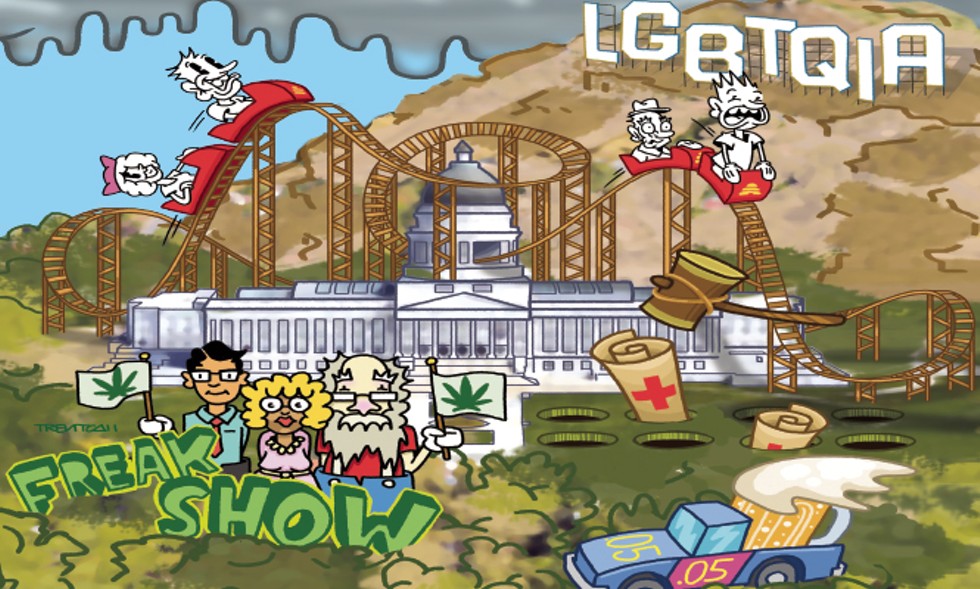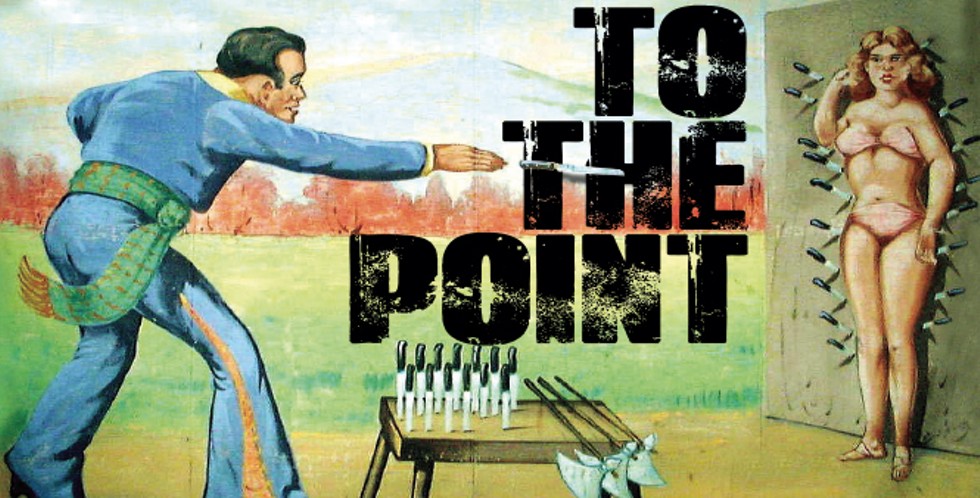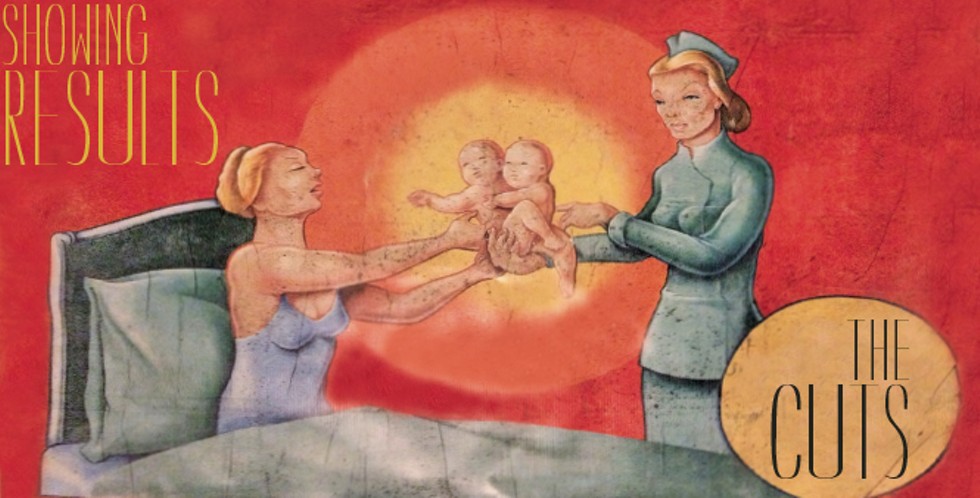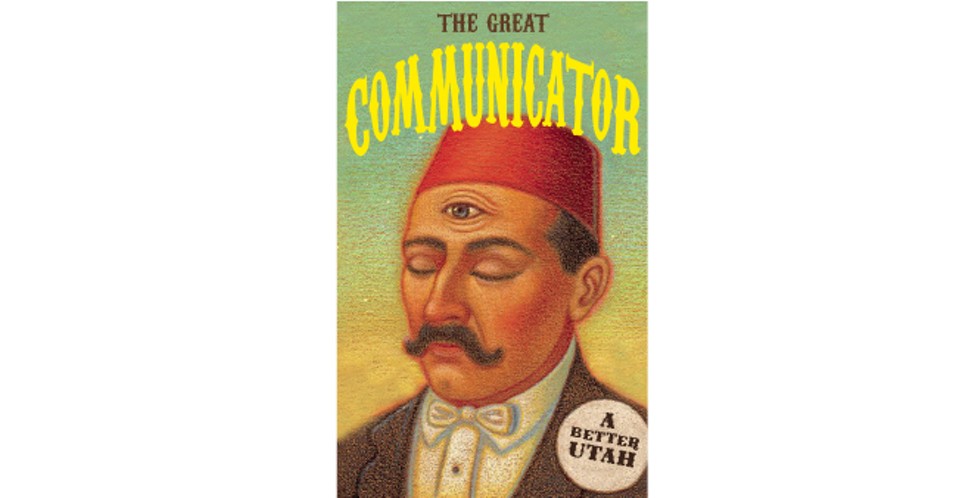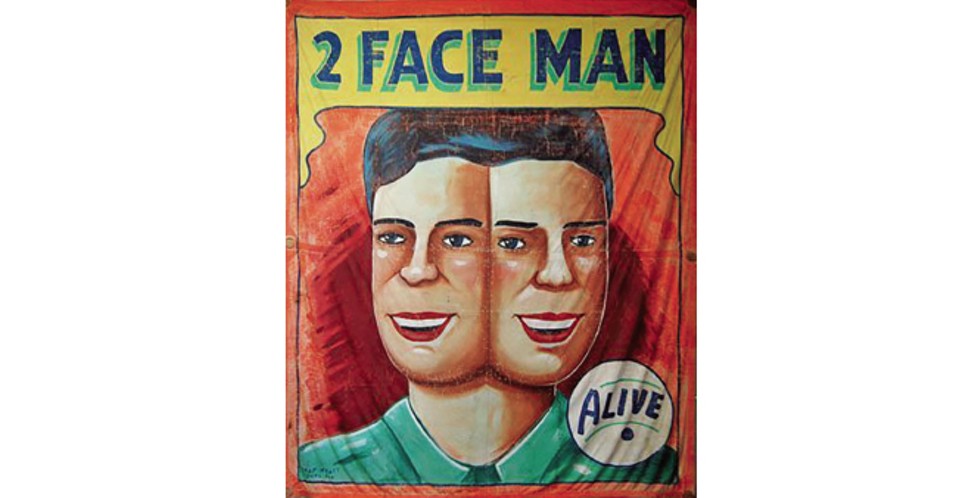Year
Each winter, the Utah State Capitol buzzes to life when 29 senators and 75 representatives, the governor and his administration, countless staffers, advocates, security officers, journalists, spectators and more embark on a frenzied 45-day journey that we call "the session."
With a definitive start date, it can feel like the state's business is starting anew—a fresh slate to improve (or sour) the lives of Utahns. This year, there is expected to be well over 1,000 bills introduced. Some of them might even pass. New bills. New laws. New conversations.
But that's deceiving; the 2018 session is not a dewy dawn. State code, of course, is built on the laws that were passed or ironed out in yesteryears. And for this reason, it's useful to examine what happened in the past. Because lawmakers who ignore past sessions are doomed to repeat them, as the saying goes.
So whether a lawmaker's personal history is marred with a careless vote he or she made, or it's notable that the legislative body wasn't able to pass a widely supported bill, that's worth examining.
Step right up to some of this session's pressing issues!
Who can you turn to to pass laws when the lawmakers won't? The answer: Why don't you just do it yourself?
As we head into the session, it's possible there will be bills—even some with widespread public support—that lawmakers will fail to pass. With a 45-day window, legislators can't conceivably pass everything introduced as they rush to beat the ticking clock—nor should they. But some of the bills are resuscitated annually, kicked around, worked and reworked only to die once again when the lawmakers cheer sine die.
Eventually, when groups are fed up with lawmakers' inability to pass laws themselves, they've been known to map out another route and go directly to the voters. This year, as voters watch what's happening on the Hill, they should also consider whether they'll support a range of ballot initiatives that have been stewing for quite some time and could end up on the ballot come election time.
At least two of the initiatives would raise taxes. In conservative Utah, it's conceivable that lawmakers are afraid of staining themselves with a tax increase (albeit minimally, campaign smears don't usually get into the weeds). A few more initiatives deal with elections and election districts. And the final one focuses on weed.
For an initiative to appear on the ballot, it has to first be supported by 10 percent of the voters who participated in the most recent presidential election. That amounts to a little more than 100,000 residents from this election cycle. Additionally, signatures need to be collected from 26 of 29 senate districts.
Fund The Gap
When Congress passed the Affordable Care Act in 2010, Utah responded by suing to block a mandated expansion of Medicaid. The outcome was that the state didn't have to accept dollars for Medicaid expansion, but it continued to pay into the federal system. An expected front to federal overreach, perhaps, but a stance that, nevertheless, left about 100,000 people in what's been referred to as the "coverage gap"—a demographic that makes too much money to qualify for one set of programs but not enough to qualify for others. Two-thirds of whom are working one or more jobs, according to Utah Decides Healthcare, which launched a ballot initiative to expand Medicaid.
"They're typically low-wage income earners," campaign manager Rylee Curtis says, as well as non-working caretakers and students.
In order to collect, Utah would be on the hook for 10 percent of the funds. Still, supporters say, the federal match is an enormous incentive.
"It triggers about $900 million that would come back to the state," Curtis says. Part of the group's message focuses on the economic argument—that a 10 percent investment is a hell of a deal.
To pay for Utah's portion, Utah Decides Healthcare is proposing nudging up the state's non-food item sales tax from 4.7 percent to 4.85 percent. For the average Utahn, the campaign estimates, that increase equals about 3 cents extra for every $20 spent on non-food items.
In 2016, the state passed House Bill 437, a health care bill that, among other things, provided Medicaid to the state's vulnerable homeless population. Curtis notes that while she supports the effort, Utah carried 30 percent of the costs and it didn't diversify the risk pool.
"It was a great first step," she says. "Seeing some movement forward was really inspiring. However, it did not cover the entire expansion population and really. it left out working Utahns." (DWH)
Direct Primary Election Act
The Count My Vote ballot initiative started out bold. Organizers wanted to blow up the entire caucus selection system for state candidates and get candidates on the ballot through signatures.
Since November, though, and after public hearings, they scaled back that initiative and, instead, want to simplify the 2014 law, Senate Bill 54, they helped create that allows for candidates to get on the ballot through signatures or by the caucus.
That's exactly what happened in last year's race for the Third Congressional District between Chris Herrod and John Curtis. Herrod was selected through the caucus, but Curtis, sensing strong voter support, got on the ballot via signature collection.
"It justified itself," says Rich McKeown, County My Vote's executive chairman, about the signature-gathering process. "But the fact of the matter is, there's been a group of people who believe there's only one legitimate way to get on the ballot and they have been consistently attempting to litigate, agitate, go through the [political] parties to modify or ameliorate the effects of SB54."
Those attempts don't appear to be stopping, either. Just last week, proponents of the caucus system filed paperwork for a new ballot initiative that would restore the caucus system and eliminate SB54.
McKeown says their initiative plans to lower the threshold for signatures necessary to get on a ballot. The initiative would require only 1 percent of party members in a jurisdiction. Curtis submitted more than 15,000 signatures while only 7,000 were required, according to a Salt Lake Tribune article. If the ballot initiative were to pass, that threshold would be even lower.
"We didn't think there would be a way to possibly do that through the Legislature and to decide it for us," McKeown says. "There are contrary forces that believe there is only one way to do it, that is the caucus convention system." (RH)
Better Boundaries
The Better Boundaries Initiative is backed by members from both political parties, including co-chairs Jeff Wright, a Republican, and Ralph Becker, a Democrat, who spoke to City Weekly. The aim is to establish an independent commission that will be delegated with the task of redrawing political districts.
"In a sense, it is to combat gerrymandering," Wright says.
The initiative has two key components. First, it would set up a commission comprising Democrats and Republicans, and a chairperson appointed by the governor. The board's task would be to map out legislative districts and U.S. House of Representative districts.
The commission would submit its maps to the Legislature for final approval.
The second aspect is establishing a set of standards that would guide the commission as it figures out fair boundaries. The standards ask that communities and neighborhoods stay together, for example.
"Currently, the process is very broken," Becker says. "We have a system where legislators are picking their voters. They're deciding where the boundaries are. Incumbents are deciding how to protect their districts."
A byproduct of the system as it stands, is that many elections in the state aren't competitive, the Better Boundaries Initiative argues. When the district is drawn to favor a candidate from one political party over another, it deters challengers from running.
"We don't have boundaries that reflect the natural boundaries of communities," Becker adds. "There's a need for that. It's recognized all over the country. It doesn't matter whether it's a Democratic or Republican state, where the legislature—as is true in Utah—makes these decisions unilaterally and doesn't have any standards or transparent processes. And you get bad results."
The duo is optimistic about the prospect of getting the initiative on the ballot and getting voted into law. Polling shows a majority of the state supports the idea. (DWH)
Medical Marijuana
The Legislature debated a medical marijuana bill last year. But, not to many people's surprise, it didn't pass. For months now, the Utah Patients Coalition along with others have been collecting signatures to get medical marijuana on the ballot in 2018. DJ Schanz, who heads the Patients Coalition, told City Weekly last week they've already collected about three-fourths of the required signatures and expect to reach the goal by April.
Carl Wimmer, a former state representative, co-sponsors the ballot initiative. Even though he says he's not a "huge supporter of ballot initiatives, and it takes a lot for me to sign a ballot initiative," he believes in the process and public representation—one area he thinks the Legislature has failed when it comes to medical marijuana.
"In this particular case, the Legislature just appears to not have the will to move forward with the vast majority of something the people support and something that will help some of the most vulnerable people in society," Wimmer says. "It appears they just keep kicking the can down the road and pay lip service to appease people when they really do nothing."
Gov. Gary Herbert, in response to a student's question at a middle school in Riverton in early January, said, "I think it's going to happen," according to a Salt Lake Tribune article. The governor's office later clarified he wasn't speaking about any specific initiative.
However, it's clear this year's ballot initiative has a lot of support, albeit absent from Capitol Hill.
Wimmer, now an ex-Mormon, has criticized the LDS church and Legislature for being too intertwined since he left the political world in 2012.
He says that's a major reason legislators haven't passed anything regarding medical marijuana.
"I think the majority are doing what the LDS church wants done regardless of their constituency and I believe a majority of voters support [medical marijuana]," Wimmer says. "The fact is, by supporting this, they would be doing the will of their constituency—every indication is the church is not supportive and as long as they're not supportive, the Legislature will not support it." (RH)
Classroom Cash
Our Schools Now is on a mission to put more money into the education system by imposing a small tax across a wide base. In essence, the initiative calls for a .45 percent tax increase on both income and sales tax to raise about $700 million earmarked for education.
Importantly, says campaign manager Austin Cox, the initiative is led by some of the state's most-respected business leaders. Co-chairing the movement are Gail Miller with the Larry H. Miller Group of Companies, Zions Bank CEO Scott Anderson, and Ron Jibson, who recently retired as CEO of Questar (now Dominion Energy).
"Three of Utah's premier business leaders are really coming to the side and aid of Utah teachers," Cox says. "Recognizing, one, that we're not doing enough to put [teachers] in positions to be successful; and, two, that education is really the foundation for economic success."
The proposal aims to increase per-pupil spending by $1,000. "Utah is the lowest-funded state in the nation per student so this would take us up just a couple of spots," Cox says. Based on the group's calculations, it would cost the median household about a dollar a day. "Are you willing to invest a dollar a day in our local schools so that we can provide our teachers the resources they need to be successful?" he asks.
Cox rattles off a list of ways the money could be spent: upping teacher salaries, cutting classroom sizes, offering teacher mentorships and professional development, investing in early childhood education and purchasing technology.
"There are so many things that are absent in our schools because of lack of funding that would give teachers the resources they need to reach our students to provide more individual learning opportunities, to make sure our students are coming to school and ready to learn when they are there," he says.
For years, school funding advocates had convened with lawmakers, hoping that they could get a bill passed through the statehouse. But that funding uptick never happened to the degree the members had hoped, even after sitting on committees and drafting plans.
"We've done just about everything, and they have said, 'We're not able to do this,'" Cox says. "The only way we feel we can get this done is to go to voters with a citizens' petition." (DWH)
Notable politicos talk about lessons learned from past mistakes.
So often politicians' moves are intensely scrutinized, politicized and weaponized during their next campaign, that it seems easier for officeholders to strike the word "mistake" from their vocabulary rather than admit that they've made one.
The electorate, after all, want leaders who are decisive, smart and who pass measures that improve our lives. But voters also value bravery, humility and realistic outcomes. Nothing is less realistic than a perfect voting record, or impeccable political prowess out of the gate, or an unblemished career when it's all said and done.
Getting politicians to cop to their errors is challenging, especially in an age when some regard apologizing as spineless capitulation rather than the gracious way one acknowledges his or her errors in polite society. So kudos to the lawmakers who responded to City Weekly's inquiry asking for them to own up to a past blemish (and sorry if this information is bandied around in a future attack ad paid for by your political opponent.)
Explaining why a mistake occurred can reveal the cognitive workings of an elected leader, and according to legislators, mistakes made early in their careers refined their convictions in subsequent sessions.
Interestingly, several members admitted a time when peer pressure—not necessarily applied explicitly—caused them to cave and vote for or against a measure when their heart screamed the opposite.
Sen. Todd Weiler, R-Woods Cross, has emerged as a reckonable force and at times a contrarian. A conservative anti-porn crusader, unlike some in his party, Weiler didn't vote for Trump. As a rookie legislator, Weiler found space between his convictions and those held by the party's fiery extremes that fixate on sexual purity. That year, Weiler cast a vote he now considers a mistake.
"During my first session in 2012, I voted in favor of abstinence-only sex ed for public schools," Weiler says. "My gut instinct was to vote against it, but I succumbed to pressure from a very far-right vocal element of my party. I hoped the governor would veto it, and he did. So the bill I voted for never became law. I learned a valuable lesson to trust my instincts and not be easily persuaded by the vocal minority."
Rep. Elizabeth Weight, one of a few Democrats to vote for a law last session to lower the DUI threshold to a .05 blood-alcohol level, says she can get behind lowering the blood-alcohol level for safety, but a state that is already tarnished with infamously backwater alcohol laws shouldn't take the lead.
"Utah has established itself as such a goofy place around alcohol," she says. "We have a reputation for being so silly and childish around alcohol."
Weight sits on the transportation committee, and last year when she heard testimony from people who argued the stricter DUI limit would improve road safety, she was on board. But the potential blowback felt in the tourism industry has been worrisome. She shares another concern voiced by opponents of the bill that a provision barring "novice drivers" from having any alcohol in their system would unfairly capture immigrants who have been skilled drivers for years but had just recently obtained a license in the U.S. Weight expects to see an amendment introduced this year to address that problem.
She also voted for a bill last year that mandated the Salt Lake County mayor select a site for a new homeless shelter. She feels, however, that the bill was rushed through the Legislature. And the outpouring of emails she received from people who were opposed to the proposed locations had Weight second-guessing her vote.
"As much as those are good ideas and I know that there's kind of a plan in place, there had not been enough discussion," she says.
A legislator for more than two decades in the House and now Senate, Margaret Dayton, R-Orem, adheres to two guiding principles: support the U.S. Constitution and maintain the family as the fundamental unit of society.
She feels her support for legislation that made voting easier and more convenient went against her commitment to the former.
"Initially, I agreed with the idea of extending election time from a day to two weeks of early voting. And I also voted in favor of some of the vote-by-mail legislation," she says. "In retrospect, however, I have some serious concerns with those changes, and I am reminded that the right to vote was bought for us at a serious cost.
"Voting is a blood-bought freedom, and the changes I have supported have decreased the significance of an election day when people needed to make some effort and sacrifice to go to the polls. [The] inconvenience does not match the cost paid to vote, and there seems to be an increased opportunity for voter fraud and abuse of the system," she continues. "It is also disappointing the changes have not generated an increase in voter preparation and participation."
Rep. Timothy Hawkes, R-Centerville, also muses on a time when he wanted to vote one way but ended up voicing the opposite.
"The substance isn't all that important, but a colleague made an eminently reasonable motion in a committee hearing, one I thought most members of the committee would support," he remembers. But when it came time to vote, Hawkes watched as several committee members cast no votes.
"When it came to me on a roll call vote—and after a series of 'no' votes—my head thought 'yes,' but my mouth said 'no,'" he says. "I knew it was the wrong call the moment the words came out of my mouth. I felt awful, and at the time didn't realize I could've corrected it before the vote went final."
He chalks it up to a rookie mistake and points out that his vote didn't affect the outcome, but it stuck with him nonetheless and highlighted the real power of institutional forces and social pressures between legislators. Hawkes figures these forces aren't all bad. They can forge compromise and "knock the rough edges off" bills that need workshopping. "But in that instance, it highlighted a personal failing," he says. "I didn't have quite the political courage or backbone I thought I had."
He says the experience has also shaped him to be a better public servant. "I made a commitment to vote my conscience over expediency when the choice is clear," he says. "That commitment has been tested in the years since, and I'm happy to report that I've lived up to it. Lesson learned."
Several lawmakers held public office before their foray into the Legislature and the choices they made in other realms have informed their behavior in the statehouse.
Logan Wilde regrets supporting a sidewalk to nowhere when he served on the Morgan County Council. At the time, that jurisdiction was in the middle of a development approval.
"The agreement required the developer to put a sidewalk in which connected to nothing and went nowhere," Wilde says. "The developer wanted to take the money to construct the sidewalk and put it into local park equipment for the community instead."
The council was reticent to amend the agreement, though it was getting flak from some in the community who said the area would eventually be developed and a sidewalk was important for school children who walked to a bus stop. The council wanted to avoid the appearance that it sided with the developer.
"It wasn't until later I visited the property to see what the developer's concerns were," he says. "I had trusted the other council members to help with the gaps in the discussion. I have regretted this vote more than any other to date. After visiting the site, I saw that there was a sidewalk on the other side of the road and the side of the road which was being discussed had a high steep bank. Excavating the bank would make the bank unstable. To stabilize the bank would require a large excavation of the surrounding ground and would cost to the developer a large sum of money.
"The sidewalk was installed and to my knowledge has never been used. The playground equipment offered by the developer would have added much to the community instead. I have learned that community prejudice can persuade votes and to research every argument on both sides of the discussion, with an open mind before voting," he said. "It is hard to live with a bad decision after the fact."
For some, legislative logistics, such as where you need to be and when, are a part of the learning curve. Newcomer Karen Kwan, first seated in 2017, says the labyrinthine layout of the various buildings recently landed her in an embarrassing situation.
"Just the other day, I went into a meeting that I had called. I was surprised that all the other people were already in the room and that they had a presentation up on the screen," she says. "I'm thinking, 'That's great. They have initiative to get everything set up for me.'" It wasn't until Kwan made her way to the front and recognized Reps. Ken Ivory and Brian Greene that she figured she was in the wrong room and had interrupted their meeting. "They were very gracious," she says. "But me, beet red in the face, had to ask for directions to my meeting."
For at least one legislator, the only mistake she was willing to admit was her poor choice in footwear, considering the amount of dashing around she'd be required to do.
"Not wearing so many high-heeled shoes," says Rep. Karen Mayne, D-West Valley City. "Having to remove my shoes to run in the tunnel from Senate to House is a pain and puts holes in your hose!"
Behold the progressive advocate, the un-retirable woman, the tax-cutter and the bottom feeder!
The state's legislative session is right around the corner.
Legislators will do their usual thing—propose bills, pass new ones and stall others—and you will likely hear about it if you're following along in the news or on social media. For 45 days, you can find out a lot of what your elected leaders are doing day-to-day. That's the easy part.
But what about others roaming the Capitol for those 45 days? Yes, those people who don't have a paneled office, who have to wear name tags and who file around talking to a representative here and a senator there. Lobbyists. Sometimes regarded as the elephant in the room, they're the ones who have the ears of legislators and, sometimes, influence their decision making.
Heck, with 104 elected legislators, the more than 400 registered lobbyists outnumber them by more than 4 to 1. So who's really running the show up there?
City Weekly spoke with a few lobbyists, past and present, about what they're up to.
The Citizen Lobbyist
Claire Geddes' name likely still brings chills to some legislators.
Geddes, a longtime citizen lobbyist throughout the 1990s and 2000s, was usually seen at the Capitol during the regular session pestering legislators about whatever latest form of "bad government" (a bad bill), in her words, was working its way through the halls.
While still involved in some bills here and there today, such as the debate over rooftop solar subsidies, Geddes, who says she's retired "at least four times," says what she did day in and day out during the session can still be done today. You just have to be strong in what you're saying, she says, and don't let power intimidate you.
Geddes would usually spend her mornings appearing on radio shows telling the public about what was going on at the Capitol. Then she'd spend the rest of the day talking to legislators and speaking at hearings. All on her own dime.
"Half the time they wouldn't let you talk in a meeting," Geddes says. "The whole secret is holding [legislator's] feet to the fire because you're so disadvantaged being a citizen lobbyist, you don't have gifts to give them. That's where [legislators] get the money to run—from all these corporate lobbyists."
Geddes, who formerly chaired United We Stand and Common Cause, says she remembers times legislators wouldn't listen to her about a bill or what needed to be changed in a bill.
She and others would then hold news conferences and talk to news media and, sure enough, she says, legislators would start to come around.
While she wasn't your typical corporate-backed lobbyist, Geddes says she did it to hold those in power accountable and to inform the public.
"It's important you be concise," Geddes says about lobbying. "It's a sick system up at the Legislature. They come up with like 1,000 bills and pass 700-800 of them, maybe. And they do that in 33 [working] days? There's no way. That's why they depend on these corporate lobbyists. The one constant is always lobbyists."
The Advocate
Chase Thomas' name might emerge in a number of causes throughout the year. Thomas works as policy and advocacy counsel for Alliance for a Better Utah, which recently, delivered a petition to the Utah County Commission calling on embattled Commissioner Greg Graves to resign.
Unlike some lobbyists, Thomas and others with Alliance for a Better Utah aren't on Capitol Hill telling legislators to vote one way or another, but are there to "advocate for balance in government and transparency," he says.
"We primarily try to communicate with the public about good policy and making sure the public knows what the balanced positions are and what they can do to help ..." Thomas says. "We're not going to legislators and telling them to vote for this bill or that bill.
"We're just really going to them and getting their positions on those bills and then communicating that to the public."
So don't call Alliance for a Better Utah a lobbying group, Thomas cautions. The alliance prefers the term "progressive advocacy group." One reason is the alliance's work is not done during 45 days a year.
They're involved in things year-round, such as the Graves petition. When the session does start, though, Thomas will be up there throughout.
As for this session, Thomas says the alliance is looking to support any bills that increase "shared prosperity for all Utahns—anything that increases access to affordable health care" as well as any bill that raises the minimum wage (which was tabled last year), to name a few.
The Senator-Lobbyist
Sen. Howard Stephenson, R-Draper, has been in the lobbying and legislating business for decades. He was first elected to the Legislature in 1993. Stephenson, though, had his start in lobbying and still works in that business simultaneously.
He's currently president of the Utah Taxpayers Association, one of the state's prominent conservative lobbying groups, and has been with the association since 1977. You might even see his name in newspaper articles about cutting taxes.
Despite wearing two hats, Stephenson says he's been up front about his conflicts of interest. He said he also hasn't supported everything the taxpayers association has backed in previous sessions.
"What I told my delegates and voters first time I ran was, 'First of all, I do have a conflict and you have to decide if that conflict is appropriate or not,'" Stephenson says.
He, of course, hasn't been the only lawmaker to work for business-backed lobbying groups while also serving as a state legislator, he points out.
"At that time [when I was first elected], there were a couple dozen members of the Legislature that were public employees or school teachers and they were directly voting on the budgets that affected their livelihood—and there was no consequence for them," Stephenson says.
Stephenson's major effort this session involves the tax bill that's been discussed in committees for months.
Some of those talks centered on what the federal government did with its tax cut and how it would effect Utahns.
"It may just be separate bills," Stephenson says. "We want to make sure both bodies [the Senate and House] support all the elements of the bills before we combine them into one bill. If we did that—and there's no expectation or promise we would do that at this point—leadership has expressed they would prefer them to be in separate bills."
The 'Scum-Sucking Bottom-Feeder'
Royce Van Tassell doesn't shy away from his label as a lobbyist.
"... I'm a scum-sucking bottom-feeder lobbyist," Van Tassell even wrote in a Salt Lake Tribune column last year in response to a piece from the newspaper's Robert Gehrke.
But that was his point, he told City Weekly ahead of this year's session. Van Tassell says he wants to get his lobbying label out there in the public and for them to know who he is instead of hiding it.
"In the public's mind, a lot of people do regard lobbyists as scum-sucking bottom-feeders," he says. "That was the point of calling it out—public perception and the reality have nothing to do with each other."
Van Tassell, who once was a lobbyist for the Utah Taxpayers Association, now is executive director of the Utah Association of Public Charter Schools. He's also registered with the Red Acre Center for Food and Agriculture, and Farm to Consumer Legal Defense Fund.
"Lobbyists end up playing a vital role for everyone that's involved in the political process," Van Tassell says. "For example, in the Legislature, you have 104 people plus the governor that are going to weigh in on votes and sign hundreds of bills.
"[They] are not and can't be expected to be experts in all of the policy they're going to be involved in."
The lobbyist says he hopes to see legislation to "create some different flavors of authorizers" for charter schools. An authorizer can be the Legislature, a local school board or the State Board of Education, for example, who permit charter schools to open and hold them accountable to state and federal education requirements.
Van Tassell says he hopes the Legislature will consider adjusting how authorizers are treated so "you don't have to play, 'Mother, may I?' other places."
Before the Legislature considers charter schools, it likely will discuss the passage of a revised education code early on in the session so other education bills can be drafted and work their way through committees. Until that happens, people such as Van Tassell will be in a holding pattern.
Bills, Bills, Bills!
What to expect during the 2018 session.
Still with us? As you follow along this session, the drama will undoubtedly revolve around questions like, What group of Utahns is pushing for this measure? And, Who elected that guy? But mostly, you'll want to know, Is that bill going to pass? City Weekly will do its damnedest to provide online dispatches from the Capitol, as well as full coverage for some of the more pressing issues.
To pique your interest, here is a one-line preview of a sampling of bills that will be introduced this year.
A Bill To:
• Eliminate a position in the attorney general's office that was specifically delegated to root out complaints about obscenity and pornography.
• Ban flying drones within a quarter mile of a prison.
• Ban talking on the phone while driving unless using a hands-free device.
• Clarify the definition of manslaughter to including one who aids in another's suicide by providing the "physical means."
• Bump up the minimum wage to $10.25 per hour and then increase it again in 2022 to $12 per hour.
• Protect someone from a civil suit if he or she tries to save a child from a locked vehicle so long as the rescue is done in good faith and authorities have been contacted prior.
• Change the state fossil from the Allosaurus to the Utahraptor.
• Require that when shelters euthanize animals, it is done by injecting them with sodium pentobarbital.
As Well As Resolutions That:
• Acknowledge that humans are contributing to global warming and asks the government to commit to making energy decisions based on the best available science.
• Encourage the use of shielded light fixtures on outdoor lights to cut down on light pollution.
• Ask Congress to exempt Utah from the Antiquities Act (the law former President Barack Obama used to create Bears Ears National Monument).


